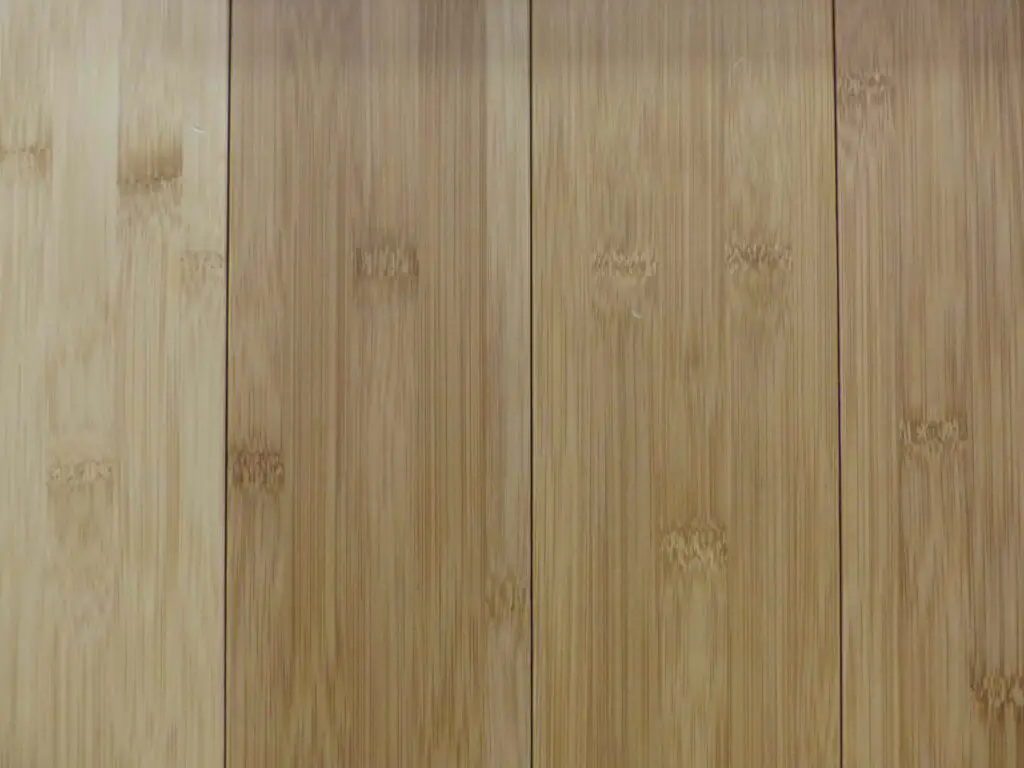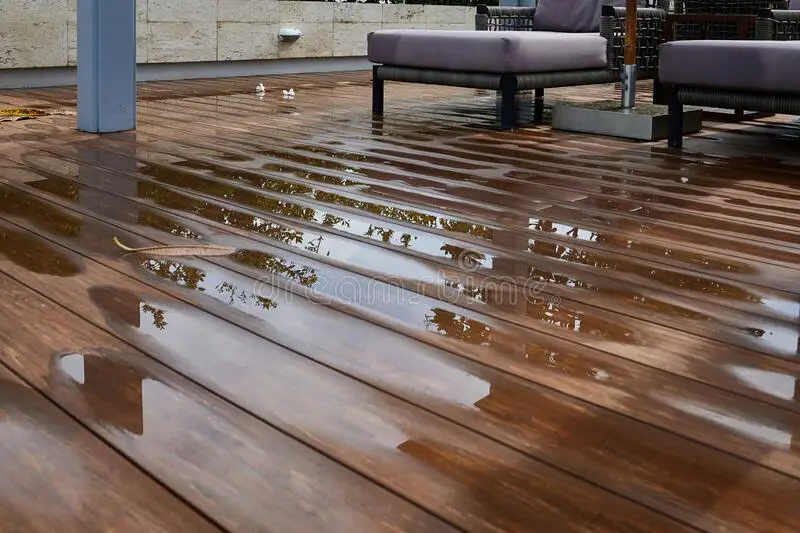Is bamboo flooring waterproof? You may be wondering this, especially if you live in a climate that sees a lot of rainfall or snow.
However, there is a catch. While the actual bamboo planks are water resistant and can withstand spills and light flooding, the finish applied to them can wear away over time when exposed to too much water.
So while your bamboo floors will be just fine during a rain storm, make sure to quickly mop up any puddles or track water in from outside.
For heavy rains or snowfalls, we recommend using a waterproof barrier.
So, let’s crack the query!
How Bamboo Flooring is Made?

The manufacturing process of bamboo flooring is quite fascinating. First, the bamboo is cut into thin strips that are then boiled in a solution of water and chemicals. This helps to soften the bamboo and make it more pliable.
Next, the strips are pressure-treated with adhesive resins and then placed on a mold. Once the mold is full, it is placed into a press where it is heated and pressed into shape.
So, the bamboo flooring is finished with a protective coating and then cut to size. The whole process takes place in a highly controlled environment in order to ensure that the finished product meets all safety and quality standards.
Types of Bamboo Floorings
There are many different types of bamboo flooring, and each has its own unique benefits and drawbacks. Here are five of the most popular types:
1. Strand-woven bamboo: This type of bamboo is extremely strong and durable, making it ideal for high-traffic areas. However, it is also one of the more expensive options.
2. Engineered bamboo: Engineered bamboo is less prone to warping and expansion than solid bamboo, making it a good choice for rooms with fluctuating humidity levels. However, it is not as hard as strand-woven bamboo and may show wear over time.
3. Click lock bamboo: This type of bamboo flooring is easy to install, thanks to the interlocking pieces that “click” together. However, it is not as durable as other types of bamboo and may scratched or dented more easily.
4. Hand-scraped bamboo: Hand-scraped bamboo floors have a more rustic look and feel, thanks to the hand-scraped finish. However, this type of flooring is more prone to scratches and dents than other types of bamboo.
5. Carbonized bamboo: Carbonized bamboo has undergone a process that gives it a darker color and softer feel. This makes it a popular choice for bedrooms and other areas where you want a cozy, inviting atmosphere.
However, carbonized bamboo is not as strong or durable as other types of bamboo.
Is Bamboo Flooring Water-Resistant?
Bamboo flooring is often lauded for its many virtues, including its water-resistant properties. However, does this mean that bamboo flooring is completely waterproof?
The answer, unfortunately, is a bit more complicated than a simple yes or no. While bamboo flooring is certainly more resistant to water damage than many other types of flooring, it is not completely impervious to moisture.
In particular, bamboo flooring can be susceptible to warping and discoloration if it is exposed to excessive moisture.
As a result, it is important to take care when cleaning bamboo floors and to avoid any standing water. With proper care and maintenance, however, bamboo floors can provide years of beauty and durability.
Is Bamboo Flooring Waterproof?
Bamboo flooring is an excellent choice for any room in your home – except, of course, the bathroom. That’s because bamboo is not waterproof, and exposure to water can cause the material to warp and discolor.
So if you’re looking for a flooring option that can stand up to spills and wet feet, you’ll need to look elsewhere.
However, bamboo is extremely durable and easy to care for, making it a great choice for busy households.
And when it comes to style, bamboo definitely has the edge over other materials. So if you’re willing to take a little extra care with your floors, bamboo may be the perfect choice for your home.
Related Topic: What Is The Best Underlayment For Hardwood Floors?
Bamboo Flooring in Bathroom
For those who want to add a touch of the exotic to their bathroom, bamboo flooring is a perfect choice. Made from the wood of the bamboo plant, this type of flooring is both durable and beautiful.
Although it is often associated with Asia, bamboo is actually native to many parts of the world, including Africa, Australia, and South America. Bamboo is a fast-growing plant, and it regenerates quickly after being harvested.
As a result, it is considered to be a sustainable resource. When it comes to bathroom flooring, bamboo is resistant to water and moisture, making it an ideal choice for high-traffic areas. In addition, bamboo is easy to clean and maintain.
Bamboo Flooring in Kitchen
Bamboo flooring is available in a variety of colors and styles, which makes it a versatile choice for any kitchen. It’s also environmentally friendly, as bamboo is a renewable resource.
So if you’re looking for a durable, easy-to-clean flooring option for your kitchen, bamboo may be a perfect choice.
Bamboo Flooring Cost
Bamboo flooring is an affordable option for those looking to renovate their home on a budget. It is significantly cheaper than hardwood flooring, yet still offers a natural and elegant look.
Installation is also relatively easy, as bamboo planks can be clicked together like laminate flooring. In terms of maintenance, bamboo flooring is very durable and only needs to be swept or vacuumed regularly.
However, it is important to avoid using harsh chemicals or cleaners, as this can damage the finish. Overall, bamboo flooring is a cost-effective way to update your home without breaking the bank.
So, a good quality bamboo flooring costs between $8 to $10 per square foot including both materials and labor.
Bottom Line
Is bamboo flooring waterproof? Let me put it this way- if water is slowly dripping out of a faucet and landing on your bamboo floor, the floor will eventually start to show signs of damage.
However, if you accidentally spill a glass of water or track in some mud, most bamboo flooring can take the abuse without any long-term problems.
So, while I wouldn’t call bamboo flooring “waterproof” but, it can definitely hold its own against everyday spills and messes. And as an added bonus, it looks great doing so!
Have you had any experience with bamboo flooring in high-traffic areas like bathrooms or kitchens? We’d love to hear about it in the comments section below.
Related Topic: How to Remove Hardwood Flooring For Reuse?
FAQs
What happens if bamboo flooring gets wet?
After getting wet, bamboo flooring leads to wrapping, color fading, and distorting. Moreover, water damage can reduce the durability and lifespan of bamboo flooring.
How long will bamboo flooring last?
The lifespan of bamboo flooring depends on the area where it is installed, the moisture level of a home, and what cleaning method you are using to maintain your floor. However, high-quality bamboo flooring can last up to 25 years with proper care.
Image Credit: Sompetch Kanakornpratip | Dreamstime.com


2 thoughts on “Is Bamboo Flooring Waterproof Or Not?”